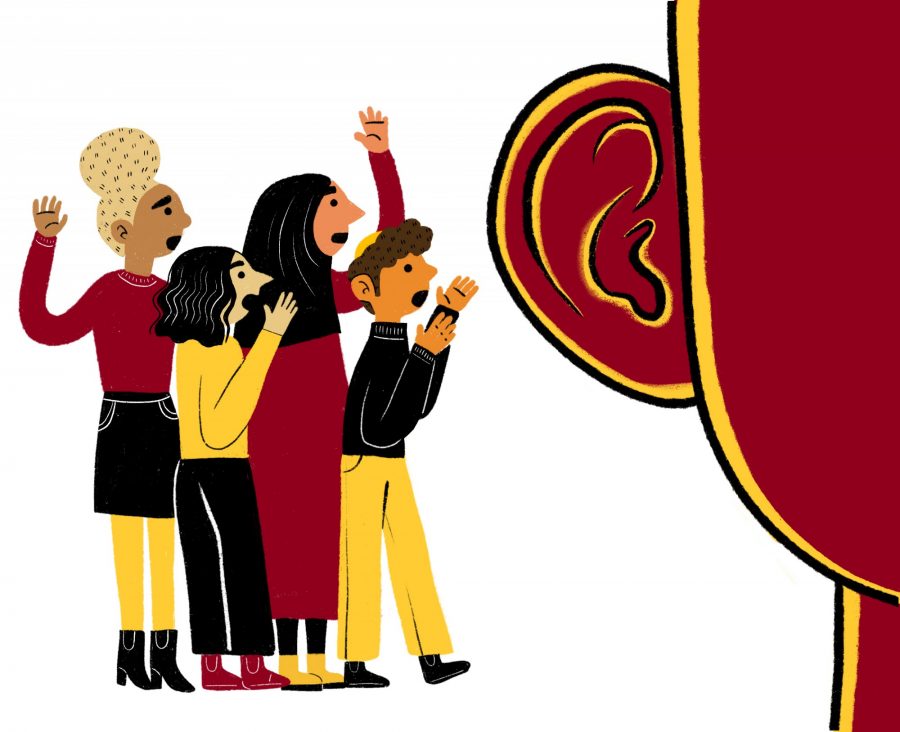The Minnesota Hillel is asking University of Minnesota students to vote for a definition of antisemitism during the annual all-campus election referendum.
The International Holocaust Remembrance Alliance, which consists of delegates from 34 countries, established the working definition of antisemitism as “a certain perception of Jews, which may be expressed as hatred toward Jews. Rhetorical and physical manifestations of antisemitism are directed toward Jewish or non-Jewish individuals and/or their property, toward Jewish community institutions and religious facilities.” Hillel’s usage of the IHRA working definition, particularly portions which classify some critiques of Israel as antisemitic, has drawn backlash from University community members who are concerned with free speech suppression.
A number of other colleges and universities, such as Arizona State University and the University of Georgia, have adopted the IHRA definition in the 2020-21 school year.
After garnering 850 student signatures last week, Hillel was able to successfully bring the question of defining antisemitism to the University’s all-campus elections ballot. The signature benchmark to get a question on the referendum is 800.
Students can vote on the definition, along with several candidates for student government, in the all-campus election from March 22 to March 26. If adopted, the definition would reflect the student body’s opinion rather than be legally binding.
A series of antisemitic incidents have taken place at the University over the past few years, where fliers with swastikas could be seen plastered around campus. In 2017, the University of Minnesota Police Department arrested an 18-year-old University student for allegedly vandalizing a desk in the 17th Avenue Residence Hall with a swastika.
Hillel student president Kelsey Bailey said her friends have experienced Holocaust jokes from University professors. According to Bailey, the University should be doing more to address antisemitism on campus.
“I’m hoping that there’d be some form of action from the administration, whether that’s education for student government or professors or students on antisemitism and like what it actually is and how it happens on college campuses,” Bailey said.
A 2020 survey from the American Jewish Committee found that only 53% of adults over the age of 18 are familiar with the term “antisemitism.”
“The IHRA (International Holocaust Remembrance Alliance) definition is currently the most widely accepted definition, providing an educational tool for various governments, organizations, and universities around the world,” said Hillel assistant director Mackenzie Litt in an email to the Minnesota Daily. “Adopting this definition would provide the U with a compass.”
The definition has drawn criticism from some University students and faculty, as well as national organizations like the American Civil Liberties Union. An open letter to the Minnesota Daily, authored by pro-Palestinian Jewish students and signed by over 180 University community members, stated that “the IHRA definition does not lessen the threat of antisemitism, and concerningly, has been used to conflate legitimate criticism of Israel with antisemitism, obstructing political and academic freedom.”
According to the IHRA, a manifestation of antisemitism includes targeting the state of Israel. An example of an antisemitic act could be “denying the Jewish people their right to self-determination, e.g., by claiming that the existence of a State of Israel is a racist endeavor.” However, the IHRA states that criticisms of Israel that could be applied to other countries are not antisemitic.
The authors of the letter expressed concern that the definition could suppress free speech, especially the voices of Palestinians, to criticize Israel. The letter also argued that a shortcoming of the proposed definition is that it does not focus on white supremacy.
“By making criticisms of Israel a focal point instead, it does not effectively protect the safety of Jews or our allies. After the events of January 6 at the Capitol and the recent upswing in anti-Asian violence, it is more important than ever to address antisemitism in a way that clearly connects with all other forms of racism, oppression and discrimination,” the letter reads.
When asked whether Hillel considers criticism of Israel an antisemitic action, Litt said “the students are interested in adopting the working definition [of antisemitism], not the examples. Those are just examples.”
Secretary of Students for Justice in Palestine, Kenza El Abdallaoui, an author of the letter, said associating antisemitism with critiquing the Israeli government dilutes real antisemitism.
“It puts Palestinians and it puts their allies in a position where they either have to choose between their human rights or being labeled an antisemite, and that is not a position that anybody should be in,” El Abdallaoui said.
During the late 1940s to early 1950s, Jews fleeing persecution in Europe — some survivors of the Holocaust — migrated in mass numbers to Palestine, effectively doubling the Jewish population there. Prior to when the modern state of Israel was established in 1948, the country then was majority Palestinian Arabs and controlled by Britain.
As Jews migrated to Palestine, Arabs viewed the influx as part of European efforts to colonize their land and opposed it. Clashes between Israeli and Palestinian forces led to the displacement of over 700,000 Palestinian refugees. At the end of the war, Israel controlled most of the territory, and Palestinians were without a state.
The West Bank, east of Israel, is home to up to 3 million Palestinians and is under Israeli occupation. The United Nations and many Palestinians consider the West Bank illegally occupied land by the Israeli military. Some academics and activists define Israel’s occupation of Palestine as settler colonialism. Settler colonialism, a type of colonialism, is the process where settlers arrive seeking to replace the indigenous people of the land.
“If you say ‘the state of Israel is a racist endeavor, then you’re being antisemitic,’ then that’s going to affect how people view Palestinian activists and people who are fighting for the Palestinian cause,” said a Palestinian student activist, who asked not to be identified due to concerns about potential harassment.
Kenneth Stern, the author of the IHRA definition, spoke out in 2019 against the “weaponizing” of the definition, after then-President Donald Trump signed an executive order stating that antisemitism violates the Civil Rights Act of 1964. Though the executive order does not define antisemitism, it requires federal agencies to “consider” the IHRA working definition.
“It was never intended to be a campus hate speech code but that’s what Donald Trump’s executive order accomplished this week… This order is an attack on academic freedom and free speech, and will harm not only pro-Palestinian advocates, but also Jewish students and faculty, and the academy itself,” Stern stated in a Guardian opinion piece.
To voice support for the referendum, members of Hillel and other student groups submitted their own OpEd to the Minnesota Daily, discussing the rising tide of hate crimes against minorities, including Jews. According to the letter, accepting the IHRA definition would “signal to Jewish students — and other minority groups — that the University of Minnesota will not stand idly by in the face of rising hate and discrimination.”
“Over and over again, we have witnessed the dangerous intersection of white supremacy and hatred of minorities,” the letter stated. “For many of these hateful individuals, anti-Jewish animus, constructed on wild conspiracy theories, forms the foundation of their hatred.”
Hillel hosted a public forum on Friday to answer questions about the referendum question. El Abdallaoui said the IHRA definition of antisemitism is not inclusive to Jews like herself, who do not feel Israel is connected with their identity.
In response, Bailey, the Hillel student president, said the main focus of the definition was not Israel, but to help University community members understand what antisemitism can look like.
“This referendum is about antisemitism. … The definition of this is dealing with antisemitic acts on campus, it’s rhetorical and physical manifestations for the Jewish and non-Jewish community,” Bailey said. “This definition, with this example that relates to Israel — it’s intended to distinguish between legitimate, valid criticism of Israel and what might be otherwise thinly-veiled forms of antisemitism. So, [for example] accusing Jews of dual-loyalty, comparing Israeli politicians to Nazis and collectively holding all Jewish people responsible for the actions of Israel.”
Anna Casey, Hillel’s vice president of campus affairs, said the reason why Hillel chose to use the IHRA definition over others was that more than 30 countries, including the United States government, have accepted the definition.
In response to the letter, Casey said that the antisemitism definition they are trying to adopt is not meant to suppress pro-Palestine voices.
“We’re not a pro-Israel organization first, we are a Jewish organization for Jewish students on campus,” Casey said.
Editor’s note: This story has been updated since publication to anonymize a source due to their concerns about potential harassment.
Clarification: A sentence of this story has been updated to more accurately reflect the Israeli occupation of the West Bank.




























Richard Turnbull
Apr 20, 2021 at 3:07 am
That’s incorrect, massive waves came from Iraq and elsewhere, relative to the population of the time. So some people in the region were Arabs who had been there less time than Jews who arrived some forty years before they did, for example.
WatchungEagle
Apr 19, 2021 at 8:01 pm
There was very little immigration to Palestine at the time that was not Jewish. Very little. You know that.
Richard Turnbull
Mar 24, 2021 at 9:28 am
Israel hasn’t “refused to vaccinate” anyone and in any case it’s the Palestinian Authority and Hamas who are responsible for that — they have budgets, they can afford it.
As for Israel launching missiles at hospitals, come on — the Gaza regime along with Islamic Jihad has for years illegally sited missile platforms in hospitals, schools, apartment blocks, you name it, then launching missiles from those civilian areas into civilian areas in Israel. Those are war crimes and it’s those missile and mortar platforms the Israelis target, of course!
praiseinterracialmarriages
Mar 23, 2021 at 3:24 pm
I support Jews around the world in their desire to be free from oppression. I do not support definitions of antisemitism which call into play protests and actions which seek to counter the terroristic behavior of the Israeli government and their citizens in and out of uniform, and their refusing to provide Covid-19 vaccinations to Palestinian members of the region, their arresting and torturing children, their use of missiles to destroy hospitals and residential neighborhoods, and their general fearmongering of Muslims.
I have both Jewish and Muslim friends both in the U.S. and abroad. I desire that there be peace and amity among people. There are peaceful Israeli-Palestinian Friendship Organizations which I support and encourage people to become a part of in their activism and desire to promote peace.
During a period in the late 1900’s or early 2000’s when Israeli Prime Minister Ariel Sharon and PLO Chairman Yasser Arafat were making headway toward people in the region, and when Sharon left the Likud Party in Israel to form a new party of moderates who saw that friendship was better than war, I wrote to both Arafat and Sharon to wish them well in their efforts. Both men were in a coma at that time, as I learned from Berit, Ariel Sharon’s assistant, who wrote back to me on executive stationary.
Friends, acquaintances, and I have been closely and loosely associated with three Nobel Peace Prize Laureates. The call for friendship is imperative in our world. Hatred and ignorance has no place in decision-making, and “leaders” who espouse such behaviors should be removed. They are a vile cancer on the face of our Earth and in the history of our global community.
I do not support Minnesota Hillel’s attempt to define as antisemetic any action or statement which attempts to reign in the vile abuses of the current Israeli government.
Barry N. Peterson
Collège of Liberal Arts, Class of 1996
Past Student Senator, former College of Continuing Education and Extension
Minneapolis, Minnesota
USA
Richard Turnbull
Mar 23, 2021 at 8:58 am
The collapse of the Ottoman Empire around the time of World War 1 spurred waves of immigration into what is now the State of Israel and nearby territories, so it’s somewhat misleading to single out waves of Jewish immigrants as if no Arabs or others were not also very recent arrivals.